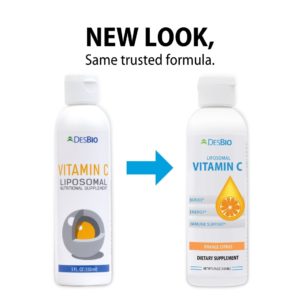Description

Liposomal Vitamin C provides an effective dose of vitamin C in a natural and pure phosphatidylcholine liposomal delivery system. This highly absorbable vitamin C will limit the risk of gastrointestinal upset or issues.
Why Liposomal Vitamin C?
Taking high doses of vitamin C orally via regular supplements can present a
few challenges. With typical products, only a percentage of the vitamin C is
actually absorbed. In addition, excess vitamin C from supplements that does
not undergo proper absorption can draw water into the lower intestine resulting
in discomfort and diarrhea for many patients. These drawbacks have led many
practitioners to rely on IV Vitamin C therapy to get their patients the high
dosing they require. Although IV therapy is effective, it can be expensive, and
only certain healthcare professionals are licensed to administer it. Liposomal
Vitamin C provides an effective and convenient method for providing patients
with a high dose of bioavailable vitamin C.
Vitamin C Supplementation
Humans are some of the only mammals that do not produce their own vitamin C.
Therefore, it is critical that we obtain adequate amounts from our diet.
Vitamin C is abundant in fresh produce, and it is easy to meet your daily
needs if you consume a whole foods diet that includes the recommended 5+
servings of fruits and vegetables per day. Unfortunately, the standard
American diet, as well as changes in the vitamin content of our food supply,
has resulted in many patients not meeting this need. In addition, certain
populations such as the elderly, smokers, and patients in poor health may
have increased vitamin C requirements.
The Many Faces of Vitamin C
In its most basic role, vitamin C is a water-soluble antioxidant,
protecting the body from damage from oxidative stress. It acts as
an electron donor and is critical to the function of at least 8
major enzymes, including those necessary for the production of collagen.
Vitamin C is often a core component of anti-aging protocols due to its
vital role in maintaining skin structure. Vitamin C therapy has also
been indicated in immune system health. Mega-dose vitamin C therapy for
the common cold was first brought to public attention via Dr. Linus
Pauling, who experimented with dosages of 1 gram or more per day.
Though some consider the benefits of vitamin C on cold prevention still
up for debate, several studies have found that vitamin C reduces
cold frequency and duration. Recently, scientists from the
University of Helsinki studied more than 11,000 children,
teenagers, and adults and found that they were able to cut their
cold risk in half. In a randomized, double-blind study, those who
took 500 mg per day of vitamin C had a 66% lower risk for
contracting three or more colds in a five-year period compared to
those who took only 50 mg per day.1 High-dose vitamin C therapy
has also become commonplace in some cancer treatments. When
vitamin C therapy was utilized in 45 patients with various types of
cancers, a significant decrease in pro-inflammatory markers,
including C-reactive protein and corresponding cytokines, was
observed.2 High-dose vitamin C therapy is also an important
component of heavy metal detoxification, especially with
mercury. Vitamin C may help loosen mercury from bonding sites
within the body and may help to protect the body from potential
damage from mercury excretion.3
Liposomal Delivery
Liposomal Vitamin C utilizes a liposome, the paramount transport
system for delicate nutrients. Liposomes are microscopic vesicles
made up of phospholipids, the same structures that make up our
cell membranes. These small, bubble-like complexes work to
encapsulate nano-particle sized nutrients, supporting their intact
delivery directly to target cells. The unique structure of the
liposome allows the encapsulated nutrient to bypass the digestive
tract, allowing for mega-doses of nutrients even at moderate
intake.4
Phosphatidylcholine
This phospholipid makes up the outermost layer of the liposome
complex utilized in Liposomal Vitamin C. Also known as lecithin,
phosphatidylcholine is the most abundant of the phospholipids
making up our cell membranes. Intake of phosphatidylcholine has
been associated with supporting brain health as well as
preventing age-related memory loss.5 Phosphatidylcholine may
help restore blood vessel health during the detoxification of heavy metals.
1 Sasazuki S, Sasaki S, Tsubono Y, Okubo S, Hayashi M, Tsugane S. Effect of vitamin C on
common cold: randomized controlled trial. European Journal of Clinical Nutrition. 2006
Jan;60(1):9-17.
2 Mikirova N, Casciari J, Rogers A, Taylor P. Effect of high-dose intravenous vitamin C on
inflammation in cancer patients. Journal of Translational Medicine. 2012 Sep 11;10:189
3 Hill CH. Interactions of vitamin C with lead and mercury. Annals of the New York Academy of
Sciences.1980;355:262-6.
4 http://www.news-medical.net/health/What-is-a-Liposome.aspx
dysfunction in the elderly: a review of the literature. Alternative Medicine Review. 2004
Mar;9(1):17-31.
- Vitamin C (as sodium ascorbate, ascorbic acid) (500 mg)
- Sodium (as sodium ascorbate) (62 mg)
- Phosphatidylcholine Natural (non-hydrogenated) (400 mg)
Payment & Security
Your payment information is processed securely. We do not store credit card details nor have access to your credit card information.




